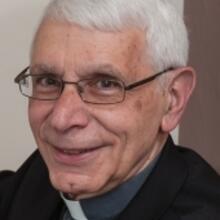Poetic Praises
When I was in high school and college, one of the most prominent extracurricular activities in Jesuit schools was membership in the Sodality of Our Lady. I owe to the Fordham College Sodality my first six-day retreat, as well as stimulating exposure to authors like Henri de Lubac, Yves Congar and Pierre Teilhard de Chardin. Thus Marian devotion and theological exploration complemented and informed each other.
It strikes me that, after some post-conciliar neglect (benign or otherwise), we are witnessing a resurgence of devotion to the mother of Jesus—one that is also theologically tutored. Ralph McInerny’s new book, Dante and the Blessed Virgin, is a further promising sign of this revival. McInerny, the Michael P. Grace Professor of Medieval Studies at the University of Notre Dame, is well known as a scholar of St. Thomas Aquinas. His expertise in both Aquinas and Dante admirably prepares him for the task he set himself in this book. [He died Jan. 29.]
One may read it, in first instance, as an accessible and inviting mapping of Dante’s Divine Comedy, helpful to both beginner and journeyman needing a reorientation to Dante’s intricate spiritual geography. Along the way, the author provides well-selected quotations from the poem, in both Italian and English, allowing us to hear something of Dante’s own voice.
As one might expect, however, McInerny further substantiates his exposition by citing salient passages from Aquinas as theological supports for Dante’s poetics. Noteworthy here is that McInerny does not limit his references to the Summa Theologiae, but also draws from the deep wells of the De Veritate and the De Malo.
The book’s distinguishing feature is its focus on the role played by the Blessed Virgin in the Commedia’s account of Dante’s journey of salvation. The author rightly reminds us that it was Mary who initiated the “rescue operation” through her intermediaries, Lucy and Beatrice. And he lingers lovingly over St. Bernard’s great prayer to the Virgin in Paradiso XXXIII that heralds the consummation of the entire quest in Dante’s awe-filled vision of the triune God.
But McInerny also gives careful and deserved attention to Dante’s depictions of Mary’s virtues that grace the terraces of the Purgatorio and provide the hope-sustaining counterpoint to the sins being expiated there. And he fittingly celebrates the glorification of the Virgin in canto XXIII of the Paradiso. Here Gabriel magnifies Mary, whose womb became “the dwelling of our desire,” while the souls of the just joyfully chant the “Regina Coeli.” Joining their chorus, Dante himself, in a touching avowal, extols il nome del bel fior che io sempre invoco e mane e sera—“the name of that beautiful flower that every morning and evening I invoke.” McInerny suggests reasonably that this exercise of the poet’s own Marian devotion took the form of praying the “Angelus” that, in Dante’s day, took place at morning and evening.
I commend McInerny’s fine achievement in this volume, but I also need to register two reservations. First, I wonder whether his laudatory highlighting of Mary’s place in the Divine Comedy risks reducing Beatrice to something of an abstraction. Granted, the figure of Beatrice is complex and controversial; still, one can leave the book with a sense that she has been absorbed into the Marian sphere to such an extent that she loses the contours of the flesh and blood gentil donna di Firenze.
Second, McInerny’s claims seem to this reader to verge, at times, on Marian maximalism. Thus he asserts: “Mary is the prime mover of the Commedia,” even while admitting the role of “intermediate causes.” In this vein, he interprets St. Bernard’s prayer to the Virgin as affirming that “grace comes to us only through the hands of Mary: she is the mediatrix of grace.” An incautious reading of such phrases could seem to compromise the unique salvific work of Christ, though certainly this is far from McInerny’s intent.
Dante, bold student of Aquinas, firmly holds that all grace derives from Christ’s paschal mystery and bears its Christic imprint. The Blessed Virgin cooperated fully with the grace brought by her son. For this reason she presides over the company of the saints. Mary stands as privileged model and intercessor for us, whether we find ourselves in a dark wood or, led by grace, labor to convert from our addictions to true freedom in Christ. One of my students who has newly realized the role of Mary in the spiritual life expressed his experience and conviction in these words: “I entrust all graces received from Christ to Mary’s safe-keeping. She can guard them far better than I.” Dante would approve.
This article also appeared in print, under the headline “Poetic Praises,” in the February 15, 2010, issue.











